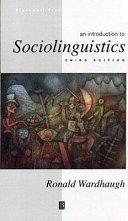
Sociolinguistics
An Introduction to the Sociology of Language Use
This university-level textbook introduces the field of sociolinguistics as the study of ways in which society influences language and language influences society. It explores the related disciplines of regional dialectology, language and social class, language and gender, language policy, literacy, and the pragmatics of language pedagogy. It seeks to differentiate among such concepts as language, dialect, accent, language shift, and language maintenance. It is somewhat unique in its presentation of the promotion of literacy as a concern of sociolinguistics. Each chapter provides helpful discussion questions and a glossary of key terms and concepts. The authors approach the topic with the view that mastery of any discipline requires understanding of the key terminology, the historical unfolding of the contributions of the major scholars in the field, and the associated research methods and findings. Thus any thorough treatment of sociolinguistics will involve elements of history, biography, lexicon, research, and even political intervention. For this reason, when used as a textbook, it has been found advantageous where appropriate to supplement chapters with readily available Youtube videos that introduce the works of key scholars in this field such as Labov, Laubach, Sapir, Spolsky, Trudgill, and Whorf. While much of the information in this text has been gleaned from other sources, a major contribution of this work is in its organization and presentation of the information. As Jerome Bruner has noted, the key problem of pedagogy is how best to organize and present information for the most efficient assimilation by the learners. Therefore, we trust that this first edition will help to address the pedagogical requirements of teachers and students alike.
- ISBN 13 : 9781535518383
- ISBN 10 : 1535518383
- Judul : Sociolinguistics
- Sub Judul : An Introduction to the Sociology of Language Use
- Pengarang : Grant Henning Ph D,
- Penerbit : Createspace Independent Publishing Platform
- Bahasa : en
- Tahun : 2017
- Halaman : 118
- Halaman : 118
- Google Book : http://books.google.co.id/books?id=Co1KMQAACAAJ&dq=intitle:sociolinguistics&hl=&source=gbs_api
-
Ketersediaan :
Therefore, we trust that this first edition will help to address the pedagogical requirements of teachers and students alike.









